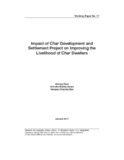| dc.description.abstract | The Char Development and Settlement Project (CDSP) was a joint initiative of the Embassy of the Kingdom of the Netherlands and the Government of Bangladesh to achieve sustainable livelihood development of coastal char dwellers in south-east Bangladesh. The third phase of CDSP (CDSP III) was implemented during 2005-2010 in Boyer Char of Noakhali district, by six government agencies and five local NGOs. BRAC coordinated the interventions of these local NGOs. This study aimed to evaluate CDSP III through assessment of indicators like employment, asset holding (natural, physical and financial), housing condition, education, food security, and crisis coping mechanism. Cross-sectional data collected in 2010 on both participants (from the program area) and non-participants (from nearby char, which was not under project intervention) were used. Propensity Score Matching (PSM) technique was used for data analysis. The findings showed substantial improvement in livelihoods of the participant households in terms of food security, income, housing condition, asset holding, etc. Although CDSP had no built-in education component, out of its own initiatives, BRAC education program had established some non-formal primary schools in the area. However, findings showed only a modest impact on education. Enrolment rates were found to be very low, even less than the rate prevalent among the ultra-poor. The number of educational institutions available was found to be inadequate for the requirement of the residents in the locality. For achieving sustainable livelihood improvement, the importance of education is inevitable; thus, further and innovative interventions, especially in the form of more educational institutions, by both public and private sectors are required. These new interventions, together with the existing program components, can be expected to improve the livelihood of the char dwellers substantially. | en_US |

